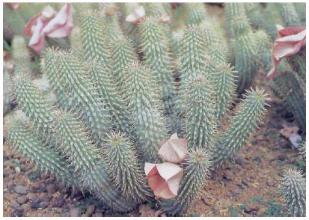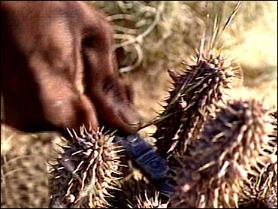Hoodia herbal pills helps fight obesity
|
|
If you haven't heard of Hoodia yet, you soon will because it is being touted as the new miracle supplement for safe, effective weight loss. Hoodia gordonii, (Hoodia) is the botanical name for a cactus like plant that grows in Southern Africa. Scientists have recently isolated several compounds in this amazing plant that are responsible for dramatic weight loss. This all-natural appetite suppressant is also being applauded for containing no dangerous stimulants that caused adverse side effects associated with weight loss products of the last decade. Hoodia (or Hoodia Gordonii) is a South African dwelling plant that the San bushman have used to help endure long hunting expeditiions for generations. Hoodia Gordonii is actually a succulent not to be confused with a cactus. It belongs in the succulent family of Asclepiadaceae along with stapelia, stephanotis and vinca. There are approximately 20 species in the genus of Asclepiadaceae. As it grows it forms stemmed clumps approximately one foot high and bears, pale purple saucer-shaped flowers in shades of red or purple brown. Real South African Hoodia is RARE and EXPENSIVE. It takes approximately 5 to 7 years for the Hoodia gordonii succulent to mature and provide appetite suppressant qualities. The African government has limited the amount of Hoodia it exports and the number of suppliers to receive it in the USA. Because of the growing awareness and popularity of this miracle herb, rip-off products that contain very little or no authentic Hoodia in them are beginning to flood the marketplace. Hoodia is registered as a protected species to prevent Bio-Piracy but is allowed to be grown on a handful of commercial farms in South Africa owned by private farmers. The hypothalamus receives signal as an indication that enough food has been consumed and this in turn stunts the appetite. This pure organic Hoodia, contains a miracle molecule that, in effect, fools the brain into believing you are full, and even stops you from thinking about food. Hoodia enhances your mood therefore you will not become irritable or weak while you are on the program. The San Tribe could go without food for 24 hours after eating Hoodia, and in the same process hunt for food in the harsh Kalahari desert. It is therefore also known to maintain a high energy level. We all know, if you don't feel hungry, you will eat less. Using Hoodia along with a sensible diet and exercise can help make your weight loss efforts much more successful! One of the active ingredients in the herb is a chemical compound called P57, which is thought to be at least partly responsible for the appetite-suppressing effects of hoodia gordonii. But this is probably an oversimplification, since herbs typically work with an assortment of chemical compounds, not just one chemical. When you eat hoodia, the saying goes, your hunger will simply be gone -- gone -- for around six hours. During those six hours, you won't crave anything. You really won't want to eat at all. The food still smells good, as usual, and they taste the same if you eat them, but you don't want to eat them! At least that's what the hoodia advocates claim will happen. To understand how all this works, you have to understand what "hunger" really is in the first place. Hunger is just an illusion. It's a signal in your brain, a chemical message that causes you to feel certain feelings and, ultimately, act on them. The hunger signal is only turned off when your hypothalamus thinks you've eaten enough food. Your hypothalamus -- part of your body's endocrine system -- decides this by sensing the rise of sugar (glucose) in your blood. Eat enough carbohydrates, and your blood sugar rises, which convinces your hypothalamus to tell your brain that you're no longer hungry. Normally, to get your hypothalamus to turn off the hunger switch, you'd have to eat a moderate amount of food. And your hypothalamus isn't very quick on the draw either: it takes around 20 minutes to figure out what you've eaten, and by that time, you've probably eaten another 800 calories. So by the time your hunger signal gets turned off, you've already overeaten yet again. Hoodia, however, contains a chemical that gets picked up by your hypothalamus which thinks it's glucose. And as it turns out, this chemical is reportedly 10,000 times more potent than glucose in triggering the chemical receptors in your hypothalamus, and so it only takes a tiny bit of this chemical to trigger the cancellation of your hunger signals.
Helpful healthcare tips by many topics wait you.
|

